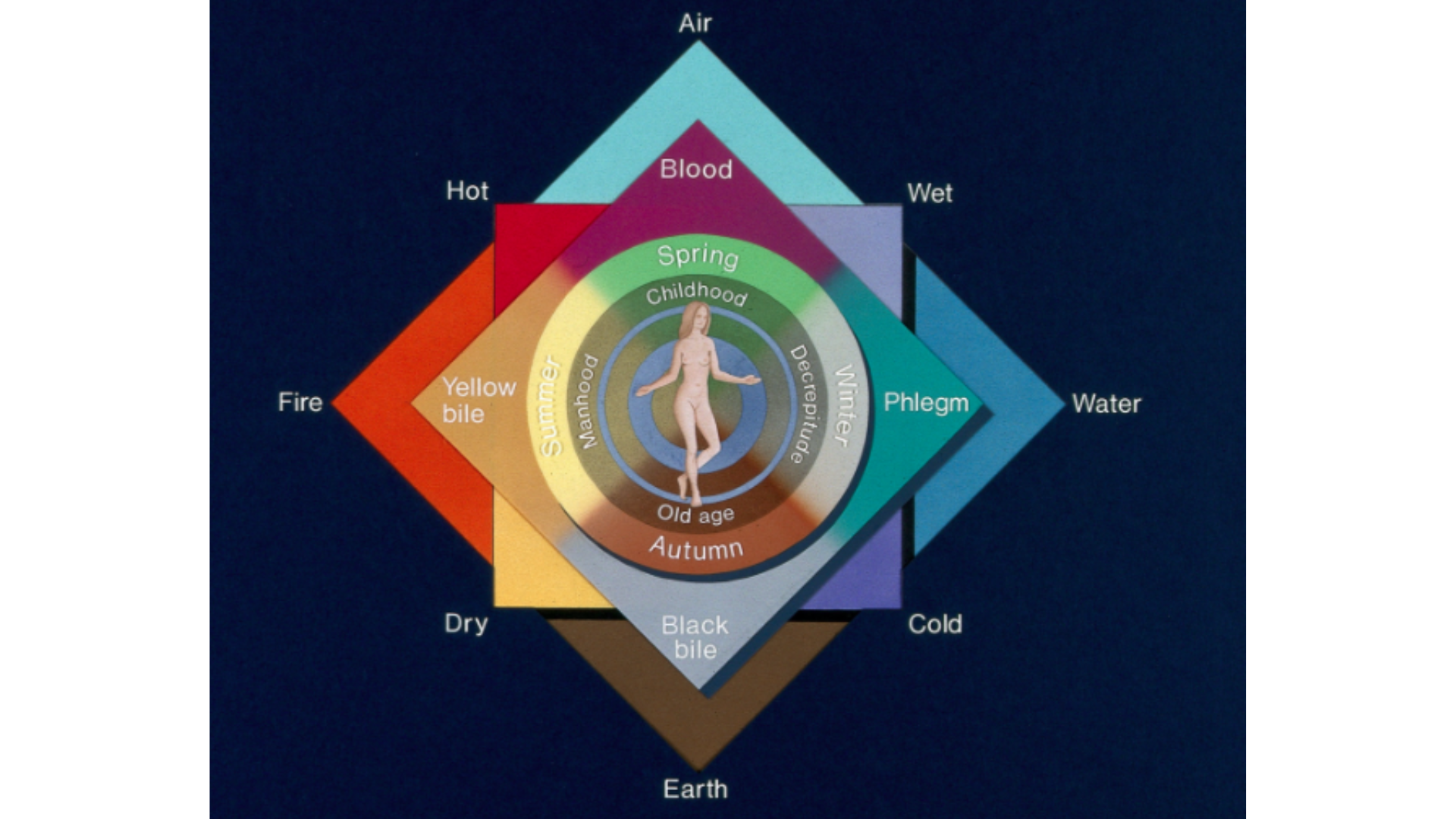My Client is a Sanguine - What do I do?

Healing truly involves the art of communication. Communication is like building a house or a school. When building a physical structure, you have to understand the ground – what you are working with – to establish a strong and steady foundation, and structure.
Your success in advising effectively your client or patient to cooperate with whatever treatment your professional expertise recommends stems much from your ability to understand your clients.
The array of people who walk through your doors will be strikingly different. Their treatment, even if they share the same disease, will follow their differences. Your skill as a practitioner is to be able to read people and work with them on their level. This happens once you can understand them.
How Unani Tibb helps You understand Them?
Unani Tibb is a system of medicine based on the idea that everything in the universe is created from the four elements. It can be difficult to understand this concept because when we say "created from the four elements," we are not merely speaking literally. Rather, we are referring to it figuratively, energetically, and metaphorically.
The four elements are AIR, WATER, FIRE, and EARTH. Use the picture below to help visually see this concept.

Going back to our discussion on client relations, the Unani Tibb principle not only allows the use of this philosophy to treat people by balancing their energies and body fluids (the four main bodily fluids: Blood Humour corresponding to Air, Yellow Bile Humour corresponding to Fire, Phlegm Humour corresponding to Water, and Black Bile Humour corresponding to Earth) in the body. It also uses this philosophy to better understand people, their psychology, and behavior on a rudimentary level.
You see, part of the philosophy is that people naturally have a dominance of one of the four bodily fluids, i.e. they are dominant in one of the four elements. This dominance creates the four temperaments:
- Sanguine (Dominant Air) - Energetic, optimistic, sociable, talkative, creative, and lively.
- Choleric (Dominant Fire) - Ambitious, strong-willed, determined, confident, and competitive.
- Phlegmatic (Dominant Water) - Calm, patient, diplomatic, empathetic, and steady.
- Melancholic (Dominant Earth) - Thoughtful, analytical, introverted, reserved, and principled.

Ways to help your clients by understanding their Temperament.
So, with the above being said, once you are able to understand your client's temperament, you can better communicate with them. Not only that but understanding their temperament will allow you to treat them more effectively in terms of nutrition, exercise, and herb recommendations.
The Sanguines
Those associated with air will likely respond to you once you give them the "center stage." Sanguines tend to hold a child-like spirit within them. They are hot and moist and are prone to excess moisture and heat. Don't bore them with long-winded treatments (unless it is an interest of theirs). Try to be more swift. You might find that you have to be a grounding figure in their life to prevent them from getting "lost in the crowds."
However, to be that grounding figure, you must make them see that you are truly invested in them and that you see them with joy and positivity. Not to belittle or patronize them, or commit the horrid act of being insincere (because people tend to see through that BS). Your interactions with them need to be sincere and that of a keen investor.
So, how can you keep them happy in cases where they need to stop a thing or two? (Remember, Unani Tibb is as much a lifestyle medicine as it is a herbal medicine.) When guiding a sanguine, humor will be your weapon.
Cracking jokes, uplifting the mood, and being more light-hearted are the 'behavioral environments' that a Sanguine will likely resonate with. This doesn't mean you forget your professionalism; rather, coat it somewhat with sweet banter amidst the therapeutic consultation. Once you do this, their sanguine guard will drop, at least somewhat. These periods of light-heartedness build a layer of trust and rapport. Once it is built, you can skillfully move on to highlight more serious matters with your client.
The truth is that you will have to give some hard truths to your clientele, truths surrounding their lifestyle and personal choices, in order to spur genuine growth and healing. But to skillfully relay that vital information, well, that is the art of a Practitioner of Genuine Healing.
The Cholerics
Your choleric client, to be frank, will simply require you to be direct. However, that is only the second half of the equation. You can only be direct and reap the benefits of your directness once you become their (your choleric client's) figure of authority. This is not an authority in the sense of a policeman or headmaster but rather the authority of a Health Expert.
So, why would they come to me in the first place if they don't think I am an expert in my field? Simply put, to test you. Don't take this personally; they are on a mission to find a solution for their concern, and they will likely after you, or have already, tested others as well. Be direct but also know you will likely have to prove your authority in this manner – they will certainly question you, and you might find yourself giving them a snippet of your expertise to show them you truly know your stuff. Once this "dominance" is established, then you will be able to skillfully help them, completely.
For example, as a Holistic Practitioner, you will often find that the client walking through your door has more than one health concern (though really it is all one problem with several symptoms). The wisest thing for you to do is help with the symptom that is causing them the most annoyance, pain, or problem in their life. Once relieving them of their burden, they will drop their guard and allow you to do your work with them, with their full compliance.
So regarding the choleric, there is a lot of strategy. This is an especially important matter when you, as the practitioner, are a more passive phlegmatic. Don't let them overrule you. Be steadfast and hold on to your own confidence in your ability.

The Melancholics
Melancholics are associated with the Earth. They are cold and dry and, like the Earth, they hold the foundation, or as Ibn Sina beautifully puts it, the center of all things. Consider the skeleton as an example in the human body, or the maternal figure in the family structure.
Metaphorically speaking, their burden can be heavy, and just as the Earth can quake, so too can melancholic souls. In fact, you will notice that they have an innate desire to be heard, just as sanguines have a desire to be seen. Let's explore this without becoming too generalistic and impractical in our advice.
Melancholics have a higher ratio of black bile humor in their bodies. Black bile coagulates the blood, attends to memory (or gives the brain the ability to remember), provides density to the body, induces appetite, and stimulates pragmatic and practical thinking. Relating this to communication, you will often find that when talking with a melancholic during a consultation, you are constantly asked the whys and hows. They will want to know. They have an appetite not just in the physical sense but in the intellectual sense as well.
However, the key here is not to let this be one-sided. This is a common mistake. Guide their thoughts as you would guide a choleric's actions. They have a lot on their mind; hear them out, as they want to be heard. Understand their concerns, and once you can intellectually meet them, answering their many concerns and questions, they will see you as an expert and take heed. They need somebody who understands life, not just medicine.
So, go slowly with them. Don't be quick to find a solution but allow time for both of you to understand the actual cause of the imbalance. Be skillful in the sense that you direct where the questioning and speculation are heading, so they don't get lost in the quicksand of mental wandering.
The Phlegmatics
Lastly, what is the best way to communicate with a phlegmatic? Phlegmatic individuals are associated with the Water element. They often exhibit calmness and patience but may struggle with inertia and a lack of drive. In fact, they might mask their inertia with calmness, so it becomes imperative for the practitioner to discern this.
Recognizing this, it's essential to approach them with empathy and understanding. Effective communication with phlegmatic patients involves a calm, steady, and supportive tone. By being patient and creating a safe space for them to express their concerns, you can build trust and rapport, making them more receptive to your guidance.
As you remain calm, composed, and non-threatening, you must also "heat up the consultation" by a degree or two. Without this, metaphorically, you both will remain still and unmoving. There is a significant difference between stagnant water and moving water. Moving water keeps the spirit alive and prevents stagnation, one of the primary causes of disease.
So how do you "heat up the conversation"? For clarity's sake, this means sparking change. You need to provide the spark by identifying the main motivator for their visit—the root of their desire to make changes in their life to live a healthier life. It may be to look more beautiful and attractive, to spend more time with their children and grandchildren as they age, or simply to feel less pain.
Once you can highlight this in your consultation, you can weave it into the remainder of your professional relationship with them as a motivator. Motivation, metaphorically speaking, is associated with the Fire element or Fire energy, which is the opposite of water. To keep a phlegmatic patient engaged, you must find ways to keep their "water" moving, but don't overwhelm them.
Use gentle reminders, set small, achievable goals, and celebrate their progress. This is the best way to communicate with a phlegmatic type.

Sidenote: Temperament is not everything. Also, gender differences are very influential. Your own temperament will be effective in how you communicate so factor that in as well. With that being said I hope this article will be effective in helping you elevate your skills as a practitioner and communicator. Stay tuned for more thoughtful posts by signing up.
Warm regards,
Shifaa Khan
UnaniReads
Holistic Healthcare Education, Inspired by Unani Tibb
DISCLAIMER: Shifaa Khan's content is for general informational purposes only. It should not be used to self-diagnose and it is not a substitute for a medical exam, cure, treatment, diagnosis, and prescription or recommendation. It does not create a doctor-patient relationship, nor a consultant-client relationship, nor a practitioner-client/patient relationship between Shifaa Khan and you. You should not make any change in your health regimen or diet before first consulting a physician and obtaining a medical exam, diagnosis, and recommendation. Always seek the advice of a physician or other qualified health providers with any questions you may have regarding a medical condition. No presentation or communication shall expressly or implicitly bind any person or entity to any contract, agreement or course of conduct, or waive any part of this disclaimer and no one should rely on unverified claims that Shifaa Khan is part of any endeavor and all such reliance is expressly disclaimed.




